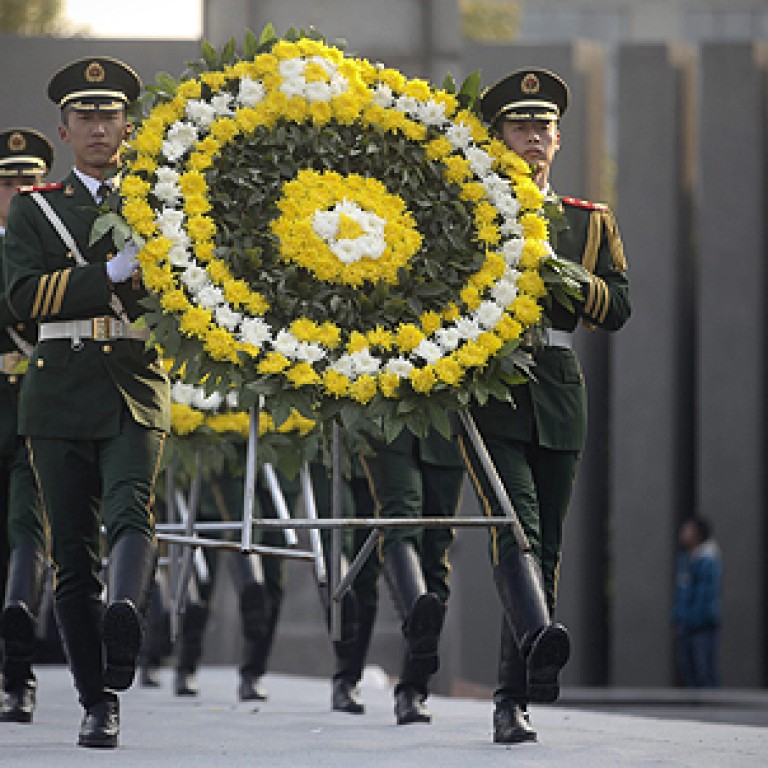
China marks 75th anniversary of Nanking massacre amid tense relations with Japan
Air raid sirens sounded in the Chinese city of Nanjing on Thursday as it marked the 75th anniversary of the mass killing and rape committed there by Japanese soldiers – with the Asian powers’ ties at a deep low.
The two countries – the world’s second- and third-largest economies – have extensive trade and business links, but the weight of history still bears heavily on their relationship.
The ceremony at the Nanjing Massacre Museum, attended by 9,000 people, began with the singing of China’s national anthem as soldiers in dress uniforms carried large wreaths across a stage.
Beforehand an elderly woman cried as she placed flowers by the names of family members listed among the victims on a gray stone wall, and a group of Chinese and Japanese Buddhist monks chanted sutras to pray for world peace.
China says 300,000 civilians and soldiers died in a spree of killing, rape and destruction in the six weeks after the Japanese military entered the then capital on December 13, 1937.
Some foreign academics put the number of deaths lower, including China historian Jonathan Spence who estimates that 42,000 soldiers and citizens were killed and 20,000 women raped, many of whom later died.
But Kai Satoru, the son of a Japanese soldier who served in China, was among those who attended Thursday’s event.
“I am here to admit the crimes. They [Japanese soldiers] competed to kill people,” he told reporters.
Fewer than 200 survivors remain, according to Chinese estimates. One of them, Li Zhong, 87, said he can never forgive, recalling how people had to restrain a man who grabbed a knife to kill Japanese soldiers after his wife was raped.
“There are fewer and fewer of us survivors every year,” he said. “We must never forget history.”
The 75th anniversary has taken on added meaning given the poor state of bilateral ties, a Chinese academic said.
“We need to remain on serious alert about the tendency in Japan to deny the fact of Japan’s wartime aggression,” said Wu Jinan of the Shanghai Institute for International Studies.
“The anniversary may only cool relations further to reach a freezing point. Currently, it’s hard to see any signs of improvement.”
At the Nanjing Massacre Memorial in the city’s west, goose-stepping soldiers carrying flower wreaths rehearsed on Wednesday, watched by scores of tourists, ahead of the ceremony, which will be an invite-only event.
Retired school teacher Li Fanling took photos of a list of victims carved into a grey stone wall, some known only by descriptions such as “Old Yang’s son”.
“Name after name,” he said. “The Japanese killed so many people but they don’t acknowledge it, so Chinese people are angry.”
A few metres away, teachers led schoolchildren by a covered pit of smashed skulls and broken femurs covered with a light layer of soil, remains of some of the 10,000 victims said to be located at the memorial site.
Protests against Japan erupted in Chinese cities earlier this year, causing an estimated US$100 million in damages and losses to Japanese firms, after Tokyo nationalised islands it calls the Senkakus but Beijing claims as the Diaoyus.
Chinese dissidents say the Communist Party nurtures anti-Japanese sentiment as part of its claim to a right to rule. Beijing typically cracks down on public protests but the anti-Japan demonstrations were allowed to take place.
A Japanese diplomat, who declined to be named, said his country hoped for an improvement in relations after Japan holds general elections in a few days’ time and China’s own leadership transition completes next year.
But some ultra-conservative Japanese politicians dispute that atrocities ever took place in Nanjing.
Japan says it has apologised to Asian countries, citing a 2005 statement by then Prime Minister Junichiro Koizumi who expressed “deep remorse and heartfelt apology” in a reiteration of an earlier pronouncement in 1995.
In an inconclusive joint study two years ago the Japanese side pointed to “various estimates” for the number of deaths, ranging from as low as 20,000 to 200,000.
